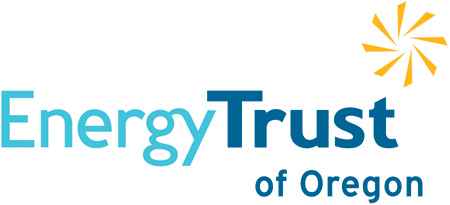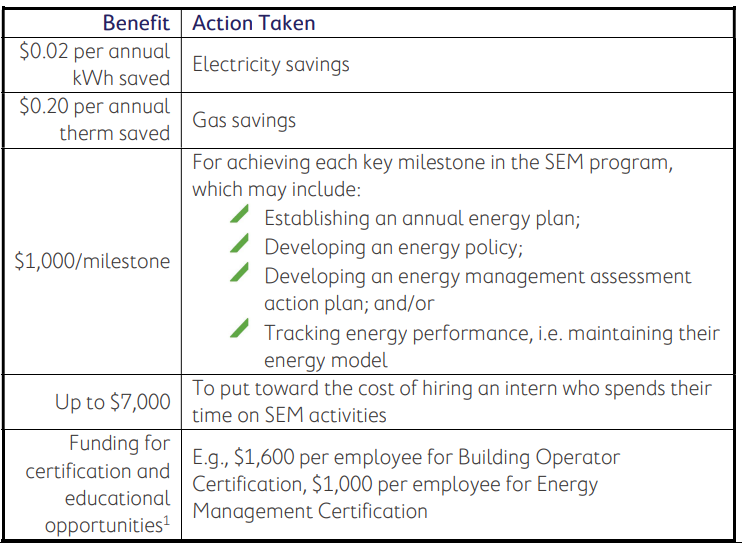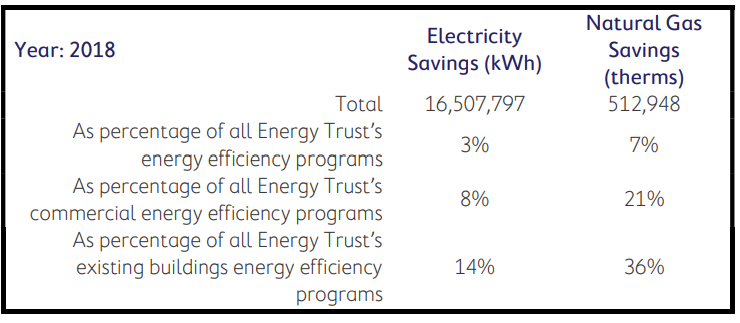Commercial Strategic Energy Management Program

Program Summary
|
Participants: |
Existing commercial and institutional buildings customers of the investor-owned gas and electric utilities in Oregon: Portland General Electric, Pacific Power, NW Natural Gas, Cascade Natural Gas, and Avista Gas. |
|
Customers are incentivized to: |
Practice strategic energy management through behavioral/operational changes |
|
Incentives: |
Financial incentives for electricity savings, gas savings, key milestone achievements, and intern support, as well as free educational resources. |
|
Support provided to customers: |
Free energy expertise is provided through energy coaches and peer-to-peer engagement opportunities – including workshops and monthly calls – that motivate customers to continually improve their energy management. |
|
Impact: |
Due to operations and maintenance improvements, a typical participant cuts about 5% of its energy consumption in the first year, while some participants have reported savings of up to 20% in the first year. |
The Energy Trust of Oregon’s (Energy Trust) Strategic Energy Management (SEM) Program teaches customers best energy management practices while providing financial incentives for energy savings achieved. With education embedded into the program, the typical cycle of activities for participants involves:
- Making an SEM plan, which involves developing an energy reduction goal, energy policy, and energy management action plan.
- Participating in workshops to learn from energy experts and other SEM program participants.
- Increasing employee participation, e.g., through establishing a dedicated energy team.
- Tracking energy performance with guidance from an energy coach.
- Repeating the cycle.
Energy Trust assesses the potential benefits, financial or otherwise, before engaging participants in recruitment meetings.
Systems Efficiency Benefits. Through workshops, engaging with energy coaches, and energy champion calls, customers are encouraged to create holistic energy management plans that consider multiple systems and are inclusive of behavioral changes, operational improvements, and capital upgrades. While the scope and depth of the participants’ involvement is largely up to the customer and their capacity, the program’s educational platforms illustrate the greater savings possible from taking a broad-based approach that deploys multi-pronged strategies to tackle energy management, which ultimately improves building systems efficiency.
Background. This Commercial SEM Program was originally modeled on the successful Industrial SEM Program. Whereas the industrial program provided an approach to address plants individually, the commercial program is portfolio-focused, offering recommendations for SEM practices to implement across multiple buildings.
Energy Trust is an independently operated non-profit and is funded by investor-owned utilities through a public purpose charge, which is used to provide its customers cash incentives, technical assistance and information to encourage energy efficiency and installation of renewable energy technology. This funding structure allows Energy Trust to develop robust programs to achieve its energy efficiency directives with the support of various program management contractors. Energy Trust operates within the territories of two electric utilities (Pacific Power and Portland General Electric) and three gas utilities (NW Natural, Cascade Natural Gas, and Avista), which cover most of Oregon’s population. As a result, Energy Trust can offer efficiency strategies for both gas and electric equipment systems for customers that use either or both energy sources.
Incentives & Customer Support
Financial incentives for the program are outlined in the below table.
In addition to offering financial incentives for electricity savings, gas savings, key milestone achievements, and intern support, the SEM program also provides free educational resources. Publicly available resources include employee engagement presentations and handouts, a Commercial SEM Guide, and a Tool Lending Library for short-term energy troubleshooting and data collection. Participants also receive personal energy expertise through several avenues, detailed below. These avenues focus on making participants self-sufficient and on developing an accountability structure for prioritizing energy management.
With an integrated platform of incentives and educational opportunities, Energy Trust of Oregon offers a comprehensive set of resources to help participants achieve their energy reduction goals.
Workshops. Energy Trust organizes a set of workshops each year for participants to attend and learn about SEM from energy experts.
- At workshops, participants can consult their energy coaches and network and engage with their peers to learn about best practices. The Energy Trust team works with participants each year to design and facilitate workshops with content of interest to participants. The Energy Trust team also often helps connect participants with one another to work through a new energy strategy or learn from others who have mastered the strategy and are willing to share their experiences.
- The set of first-year workshops typically covers the following topics after a Kickoff Event: Organization Fundamentals; Energy Tracking and Performance Monitoring; Waste and Opportunities; Engagement; and Sustaining Strategic Energy Management. The completion of the series is then marked with a Recognition Event.
"We’ve been able to put together a business case to demonstrate savings. We have a lot of tools now that we didn’t have before, and we’ve seen a difference financially."
- Matt Uchtman, Director of Operations, Oregon Convention Center
Energy coaches. Energy coaches aid participants step-by-step through the SEM Program, using a hands-on approach that encourages accountability in following through on program goals. Some participants have reported that they consider energy coaches to be the best part of the program. The close relationship with the energy coaches allows participants to give direct and immediate feedback on what is or isn’t working in the program, which energy coaches then relay to SEM Program administrators to help the program continually improve. The coaches are subcontractors of the Program Management contractor, ICF, and include energy experts from Stillwater Energy, Strategic Energy Group, Alternative Energy Systems Consulting, Inc. (AESC), and CLEAResult. Energy coaches provide the following services:
- Conduct a facility walkthrough with a program participant to inform the development of a list of identified efficiency opportunities. Energy coaches also show participants how to identify energy waste to enable them to find and address issues independently in the future.
- Conduct an energy management assessment with the participant to identify current energy management practices and inform focus areas for the upcoming year’s action plan.
- Work with participants to incorporate their organization’s individual sustainability goals, e.g., for emissions reductions or water savings, into their overall energy reduction goals and develop appropriate key performance indicators to quantify the participants’ vision of success.
- Develop energy models for participants to assess performance and make projections about future progress.
- Provide presentations and other communications materials that illustrate and simplify the status of a participant’s progress and benefits from participation. These materials help garner senior-level buy-in at a participant’s organization to gain further support for additional energy efficiency measures. Clear communication of actions taken by participants and related outcomes helps program retention.
"The hands-on approach [in the program] has been a great key to success and it’s what makes the program unique."
- Kathleen Belkhayat, Program Manager-Commercial, Energy Performance Management, Energy Trust of Oregon
Energy champion calls. The program facilitates monthly energy champion calls with all current participants to allow them to ask questions about challenges they are facing and to share best practices. Participants on the calls also report on energy performance progress, which promotes accountability by encouraging participants to regularly track their performance. After energy champion calls, participants have reported feeling reinvigorated to stay on track toward their energy goals and/or try new tactics. The calls and the workshops provide a platform for networking as well: some participants follow up with one another individually and ask for more guidance or offer assistance from drafting job descriptions or creating occupant engagement strategies, to developing standard operating procedures and energy policies.
At the end of each year of program participation – including 12 months of energy performance measurements – customers receive incentives per incremental kWh and therm of annual savings achieved against their baseline. The customer’s energy consumption baseline is recalibrated when major changes occur, or else after five years.
Continued energy improvement with demonstrated results keeps participants coming back for more.
Looking Forward
The program has had a significant impact on the energy consumption of its customers. Total savings across all participants in 2018 amounted to:
Contact:
Kathleen Belkhayat, Program Manager-Commercial, Energy Performance Management, Energy Trust of Oregon
Kathleen.Belkhayat@energytrust.org
| 503-445-2475


